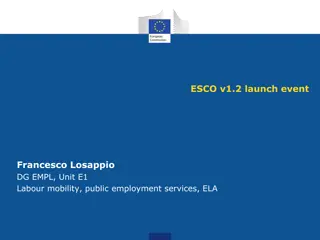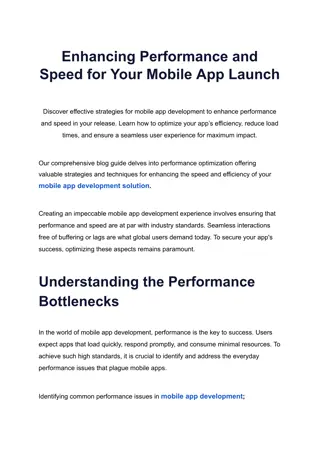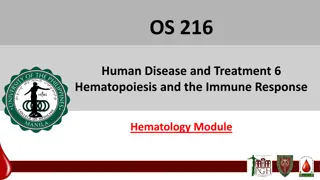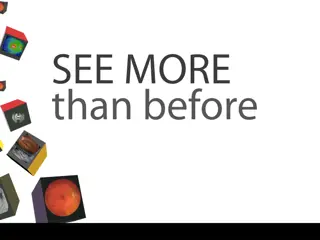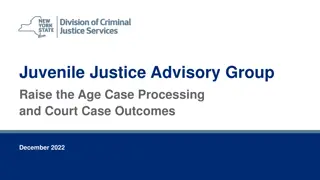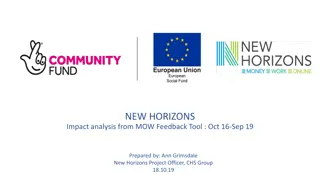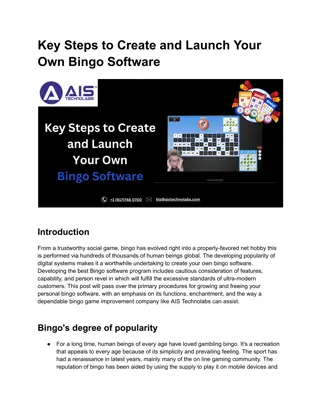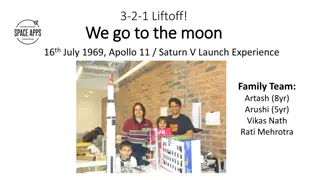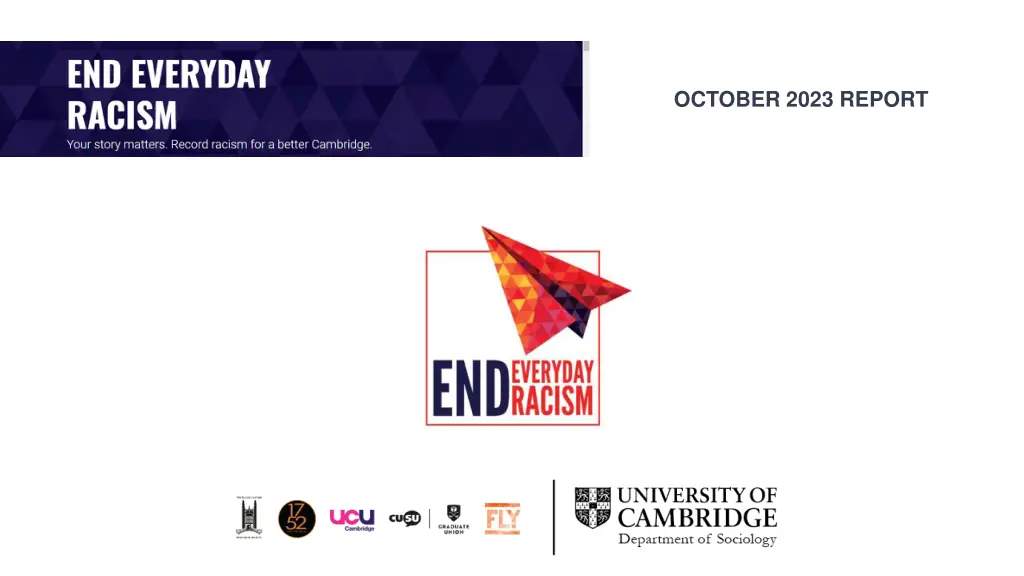
Unpacking Everyday Racism Initiatives
"Discover how the End Everyday Racism project is shedding light on the dynamics of racism, fostering anti-racism activism, and providing a platform for anonymous testimonies. Learn about their goals, activities, and impact in addressing and combating everyday racism in and around the University."
Uploaded on | 0 Views
Download Presentation

Please find below an Image/Link to download the presentation.
The content on the website is provided AS IS for your information and personal use only. It may not be sold, licensed, or shared on other websites without obtaining consent from the author. If you encounter any issues during the download, it is possible that the publisher has removed the file from their server.
You are allowed to download the files provided on this website for personal or commercial use, subject to the condition that they are used lawfully. All files are the property of their respective owners.
The content on the website is provided AS IS for your information and personal use only. It may not be sold, licensed, or shared on other websites without obtaining consent from the author.
E N D
Presentation Transcript
Racism Everyday racism Direct racism Glossary of terms Glossary of terms (1 of 2) (1 of 2) Structural racism Well-meaning Racist Incident 2
Witnessing Target witness Bystander witness Glossary of terms Glossary of terms (2 of 2) (2 of 2) Mediated witness Testimony Report 3
Unpacking the dynamics of a complex everyday phenomenon Supporting and informing antiracism activism Creating solidarity through recognising and validating those who have experienced racial abuse The EER The EER Project s Project s Goals Goals 4
The End Everyday Racism activist research project uses a digital witnessing platform to collect anonymous testimonies of everyday racism in and around the University. The EER Project The EER Project in Practice in Practice 5
Activities and Selected Events to Date Activities and Selected Events to Date End Everyday Racism published its first findings report in October 2020. Following the first report launch, the EER team met with various groups at the University to disseminate the findings and discuss ways of moving forward. EER has also partnered with various institutions to support them with starting their own End Everyday Racism projects. 6
Dr Ella McPherson and Professor Mnica Moreno Figueroa, of Cambridge s Department of Sociology, are co-founders and co-leads of the End Everyday Racism project. Dr Hande G zel is responsible for data analysis, writing reports, and dissemination of findings from the data. Louis Slater designed The Whistle platform used by EER and provides technical support to the project. Zeta Graham is the outreach coordinator for EER, organises public events, and manages the project s social media accounts. Joe Cotton is EER s communications advisor. The Team Saide Mobayed tracks the impact of the project. Anusha Arumugam manages EER s partnerships with other institutions. Dr Kerry McInerney develops EER s networks. 7
EVERYDAY RACISM IN NUMBERS EVERYDAY RACISM IN NUMBERS 8
Of those who reported their age (N=23), most were Of those who reported their age (N=23), most were between the ages 18 and 29 between the ages 18 and 29 39% 39% Most participants were target witnesses Most participants were target witnesses Target witness Mediated witness Bystander witness Total Total 29 6 5 40 40 13% 9% 18-22 23-29 30-39 50-59 9
Student 48% Witnesses were Witnesses were divided equally divided equally between between students and students and staff staff (N=40) (N=40) Academic staff 27% Non academic staff 24% 10
Forty percent of target witnesses identify as Asian, and another 40% as mixed race (N=25) 11 2 1 10 10 Arab/Middle Eastern Indigenous, Native or Aboriginal background White Black Mixed race/mixed or multiple ethnic origin Asian 11
Witnesses experienced negative racialisation in a variety of Cambridge locations (N=28) 4%4% 18% Given that remote work and teaching remain prevalent, Given that remote work and teaching remain prevalent, we asked about in person versus online incidents: we asked about in person versus online incidents: 39% In person 35 18% Online 5 Total 40 18% In a supervision In Cambridge city In a college hall or bar In my accommodation In transit (walking, cycling, etc) 12 In my place of work
Everyday racism significantly impacts witnesses work and studies Everyday racism significantly impacts witnesses work and studies Job/study at risk (N=25) Job/study made difficult (N=25) 24% 32% 44% 52% 24% 24% No Not sure Yes Not sure No Yes More than two-thirds of target witnesses feel that their job or study is or might be at risk as a result of the incident. More than three-quarters of target witnesses stated that the incident made or might have made it difficult for them to perform well in their work or studies. 13
Target witnesses reported that their intersecting identities were of relevant importance to their experiences of racism (N=20) 14
EMOTIONAL and PHYSICAL EMOTIONAL and PHYSICAL IMPACTS of IMPACTS of EVERYDAY RACISM EVERYDAY RACISM 15
Witnesses experienced negative Witnesses experienced negative emotions directed at them emotions directed at them during the racist incidents, during the racist incidents, including hostility and rejection including hostility and rejection (N=37) (N=37) 16
Witnesses felt a range of negative Witnesses felt a range of negative emotions as a result of the racists emotions as a result of the racists incidents, including anger and incidents, including anger and embarrassment (N=36) embarrassment (N=36) 17
Many witnesses physically felt Many witnesses physically felt bodily tension, nervousness, chest bodily tension, nervousness, chest pressure and breathlessness pressure and breathlessness (N=28) (N=28) 18
Among other consequences, many Among other consequences, many witnesses felt a fear of recurrence, witnesses felt a fear of recurrence, a sense of not belonging at a sense of not belonging at Cambridge, and detachment Cambridge, and detachment (N=31) (N=31) 19
KEY CONCLUSIONS from KEY CONCLUSIONS from QUANTITATIVE and QUALITATIVE QUANTITATIVE and QUALITATIVE DATA DATA 20
Respondents experience institutional loneliness Respondents experience institutional loneliness My college was extremely unhelpful and took no action . I tried to figure out what I can do about the issue. There seems to be no standard procedure for reporting incidents related to racism, and there doesn't seem to be mechanisms within the University that hold these people accountable.. Everyone around me told me to forgive him and that he was just joking and that it was not a racist comment, all of these people were white. I just know this is what Cambridge will always be like for me. I know I can't make a home here for that reason. 21
Witnesses feel guilty for not officially reporting the Witnesses feel guilty for not officially reporting the incident incident I didn't know what to do as he has a master key to my building, and thus access to my personal space. I felt guilty for not challenging it directly [ ] because I might need a [ ] reference from him. Well Well- -meaningness meaningness is under is under- -recognised recognised as racism as racism 22
Witnesses access to places and time is limited by Witnesses access to places and time is limited by racism racism I now permanently work from home and avoid going into the office as much as possible . A black colleague was visiting me at work. The porters made him wait outside the college. This has never happened to me with a visitor before or since . Witnesses feel worthless and insignificant as a result Witnesses feel worthless and insignificant as a result of racist incidents of racist incidents 23
ACTION POINTS ACTION POINTS More people More people of colour development and deployment of reporting mechanisms and in counsellor development and deployment of reporting mechanisms and in counsellor positions positions Porters should receive further training on non Porters should receive further training on non- -discriminatory practices Policymaking should better link up efforts to end everyday racism with efforts Policymaking should better link up efforts to end everyday racism with efforts to widen inclusivity and participation to widen inclusivity and participation Racism s intersection with gender, sexuality, and age Racism s intersection with gender, sexuality, and age among other characteristics characteristics should be taken into account in policymaking should be taken into account in policymaking of colour with antiracism training with antiracism training should be involved with the should be involved with the discriminatory practices among other 24
Witness feedback supports the EER project and our Witness feedback supports the EER project and our witnessing platform witnessing platform Thank you so much for doing this project! It matters so much and it would be really helpful to know more about the kinds of things that people experience, especially in a department like mine where there aren't many staff of colour and so it's very hard to share experiences. This has been very cathartic, thank you. I think it's an amazing idea that our testimonies can be collected to demonstrate the extent of racism permeating in our society, and the negative impact it creates on us personally. I chose to submit it because someone told me [that] the [U]niversity had 5 official complaints of racism in 2020... I could probably name 5 instances of racism I'd gone through in that year... So clearly something's wrong with reporting. I think they [the testimonies] should be used in diversity training events. 25
Racist incidents create an overwhelming range of emotional and Racist incidents create an overwhelming range of emotional and physical reactions for those who experience them, as well as physical reactions for those who experience them, as well as negatively impact their sense of space, time, self, and belonging, negatively impact their sense of space, time, self, and belonging, making it difficult to process and move past them. This should making it difficult to process and move past them. This should be considered in all actions taken. be considered in all actions taken. 26
To find out more, and to provide witness testimony, visit our website: www.racismatcambridge.org 27









